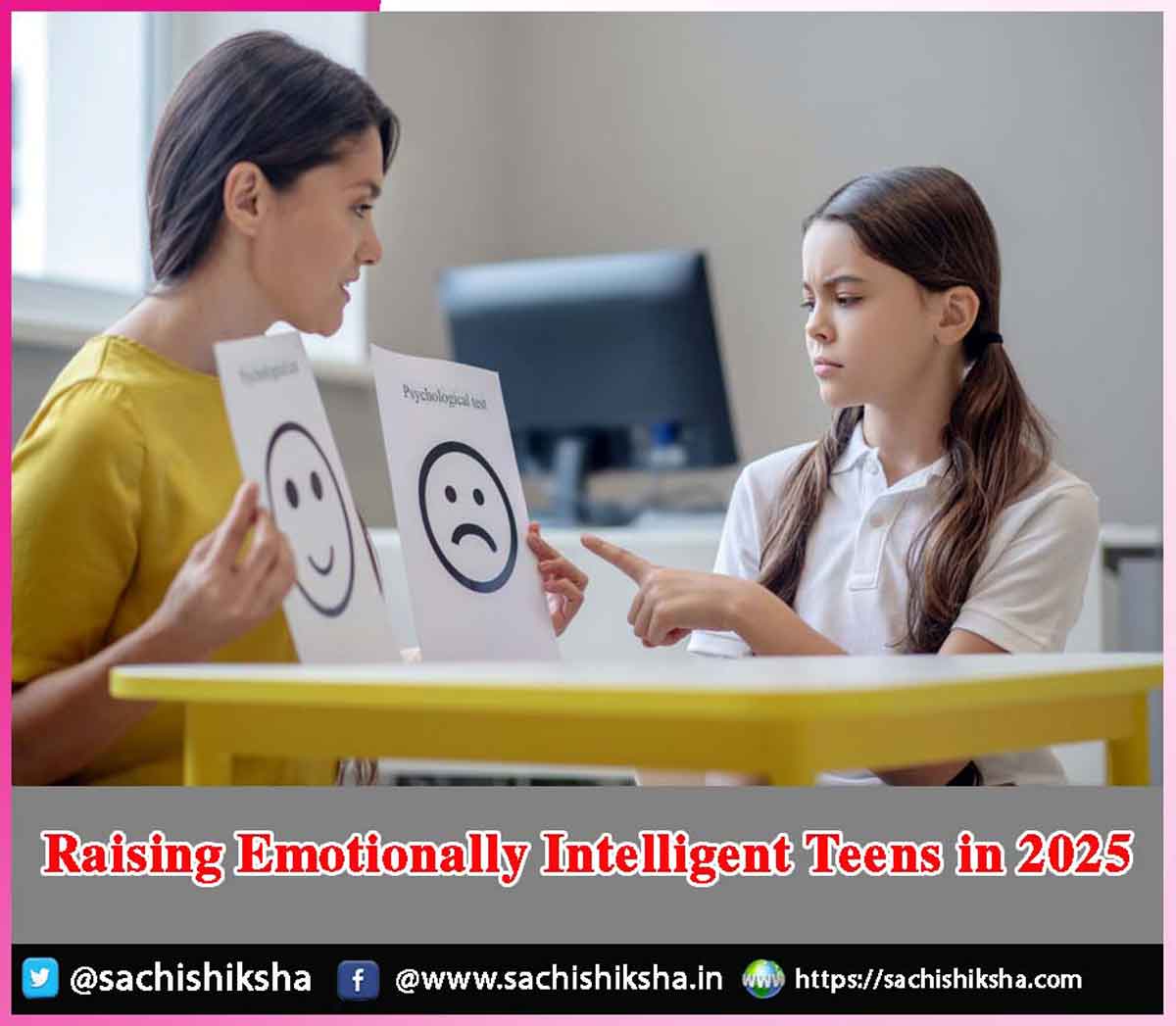Raising Emotionally Intelligent Teens in 2025
Introduction: Raising teenagers has never been easy, but doing so in the world of 2025 presents a unique set of challenges and opportunities. Today’s adolescents navigate a rapidly evolving digital landscape, increasing societal pressures, and unprecedented global issues—from climate change to AI integration. At the same time, there is a growing recognition that emotional intelligence (EI) is as crucial as academic performance or technical skill in ensuring personal well-being, success, and responsible citizenship.

Table of Contents
Understanding Emotional Intelligence in Adolescence
Defining Emotional Intelligence:
- Self-awareness – Recognizing one’s emotions and their impact.
- Self-regulation – Managing emotions constructively.
- Motivation – Harnessing emotions to pursue goals.
- Empathy – Understanding and responding to others’ emotions.
- Social Skills – Navigating interpersonal relationships effectively.
For teenagers, these domains develop unevenly due to neurological, hormonal, and social changes. Despite this, it is also a critical window for shaping emotional competence.
-
Mental Health Crisis
The last decade has seen rising rates of anxiety, depression, and self-harm among teens. While awareness has improved, access to care remains uneven. Emotional intelligence can act as a buffer; helping teen’s better process his emotions and seek help when needed.
-
Digital Overexposure and Online Behavior
In 2025, teens are more immersed in digital life than ever before. Social media, AI-driven content, and augmented reality shape their self-image and emotional responses. Emotional intelligence enables them to distinguish real connection from virtual validation and to regulate their online behavior with empathy and ethics.
-
Complex Social and Global Issues
From climate change to political polarization, teens are increasingly aware of and involved in global challenges. They can handle eco-anxiety, work together across boundaries, and turn concerns into action with the support of Emotional Intelligence.
-
The Future of Work
Automation and artificial intelligence are still changing the nature of work. Skills like emotional regulation, adaptability, and teamwork—facilitated by EI—are becoming essential for employability in a human-centric economy.
Challenges Parents Face in 2025
-
Digital Distraction
Smart phones, wearable tech, and immersive media often reduce opportunities for meaningful face-to-face interaction. Teenagers may struggle to develop in-person emotional skills if family life is dominated by screens.
-
Emotional Suppression in Achievement Culture
Many adolescents experience stress to succeed in extracurricular interests or academics. This environment can discourage emotional openness and self-reflection, reinforcing the myth that vulnerability is weakness.
-
Mental Health Stigma and Misinformation
Despite progress, stigma around emotional struggles persists. Additionally, teens can be exposed to inaccurate or toxic advice via influencers or unregulated digital content.
-
Parental Burnout and Emotional Modeling
Parents today juggle work, care giving, and technology fatigue. When parents are emotionally deregulated or disengaged, they may struggle to model or support emotional intelligence in their teens.
Strategies for Raising Emotionally Intelligent Teens
-
Foster Open, Judgment-Free Communication
How: Create regular moments to talk without distractions—mealtime, car rides, or walks. Ask open-ended questions like:
“What was something that challenged you today?”
“How did that make you feel?”
Why: Safe spaces for emotional expression help teens feel heard and understood, building trust and emotional vocabulary.
-
Normalize All Emotions—Even the Difficult Ones
How: Avoid phrases like “Don’t cry” or “You shouldn’t feel that way.” Instead, validate feelings:
“I can see that you’re frustrated. Want to talk about it?”
Why: Teens learn that emotions aren’t something to be feared or hidden but signals to be understood.
-
Teach Emotion Regulation Skills
How: Practise deep breathing and mindfulness techniques.
Encourage physical activity as a stress outlet.
Use journaling or digital mood trackers.
Why: Emotion regulation is the cornerstone of resilience and decision-making.
-
Encourage Empathy and Perspective-Taking
How: Discuss current events from multiple viewpoints.
Watch films or read stories that explore diverse experiences.
Volunteer together or engage in community service.
Why: Empathy helps teens connect meaningfully and respond thoughtfully in relationships and society.
-
Model Emotional Intelligence as a Parent
How: Share your own emotions responsibly: “I’m feeling overwhelmed today, so I’m taking a break.”
Apologize when you overreact and reflect with your teen.
Why: Teens learn more from what adults do than what they say.
-
Balance Boundaries with Autonomy
How: Set clear expectations for behavior, tech use, and communication.
Involve teens in rule-setting and problem-solving.
Why: Teens need structure to feel safe and autonomy to develop emotional ownership and self-control.
The Role of Schools in Supporting EI Development
-
Social-Emotional Learning (SEL) Programs
In 2025, many schools have integrated SEL into the curriculum. Effective programs help students practice:
Emotional recognition and labeling.
Conflict resolution.
Active listening.
Stress management.
Collaborate with teachers to understand how your teen’s school supports EI and reinforce those lessons at home.
-
Mental Health Literacy
Schools increasingly include mental health education, teaching students to recognize signs of distress and where to seek help. Parents can advocate for robust, inclusive programs that are trauma-informed and culturally sensitive.
Emotional Intelligence and Technology: A Double-Edged Sword
Risks of Tech Overuse.
Reduced face-to-face interactions.
Sleep disruption impacting mood.
Exposure to cyber bullying or toxic content.
Emotional numbing or over-comparison on social media.
Opportunities through Digital Tools.
When used wisely, technology can enhance EI.
Mindfulness apps help with emotion regulation.
Digital journaling tools support self-awareness.
Virtual therapy increases access to mental health care.
AI chat companions (when regulated) can support teens in practicing communication.
Parental Guidelines for Healthy Tech Use
Set screen-free zones (e.g. during meals, before bed).
Discuss online behavior and emotional consequences.
Co-view content and ask reflective questions.
Monitor not just time spent, but quality of content consumed.
The Influence of Peers and Social Groups
Peers play an increasingly central role in adolescence. In order to overcome pressure from others, develop one’s personality, and manage disputes, emotional intelligence is essential.
How Parents Can Help:
Encourage diverse friendships.
Talk through social conflicts without judgment.
Support in structured group activities—sports, clubs, activism—that build collaboration and empathy.
Cultivating Emotional Intelligence in Diverse and Neurodiversity Teens.
Cultural Sensitivity in Emotional Expression.
Different cultures value emotional expression in unique ways. Encourage teens to explore their cultural identity while respecting emotional norms within and beyond their community.
Neurodiversity and EI
Teens with ADHD, autism, or learning differences may require tailored support to develop emotional literacy. Use visual supports, structured conversation, and patience to help them identify and express emotions.
Global Citizenship and Emotional Intelligence
2025’s teens are globally connected. Emotional intelligence fuels global citizenship by encouraging:
Compassion for people in different circumstances.
Emotional resilience in the face of injustice or crisis.
Cross-cultural understanding and diplomacy.
Encourage teens to engage with international news, youth-led movements, and sustainability projects to channel their emotional awareness into meaningful action.
The Long-Term Impact of Emotional Intelligence
Emotionally intelligent teens are more likely to become:
Effective communicators in relationships and the workplace.
Compassionate leaders and problem-solvers.
Mentally resilient adults capable of managing life’s uncertainties.
Citizens who are involved, active, and make constructive contributions to their neighborhoods by investing in emotional intelligence during adolescence, we lay the foundation for healthier individuals and a more empathetic society.
Conclusion
Raising emotionally intelligent teens in 2025, means going beyond in monitoring behavior or measuring their academic performance. It requires guiding them to know themselves deeply, connect with others authentically, and engage with the world thoughtfully. While the digital age introduces distractions and dilemmas, it also presents new tools and pathways for emotional growth. Parents, educators, and mentors must work together to create emotionally rich environments where teens are not only allowed but encouraged to feel, reflect, express, and grow. In doing so, we nurture a generation that is not just smart, but wise; not just informed, but compassionate; not just capable, but deeply human.














































